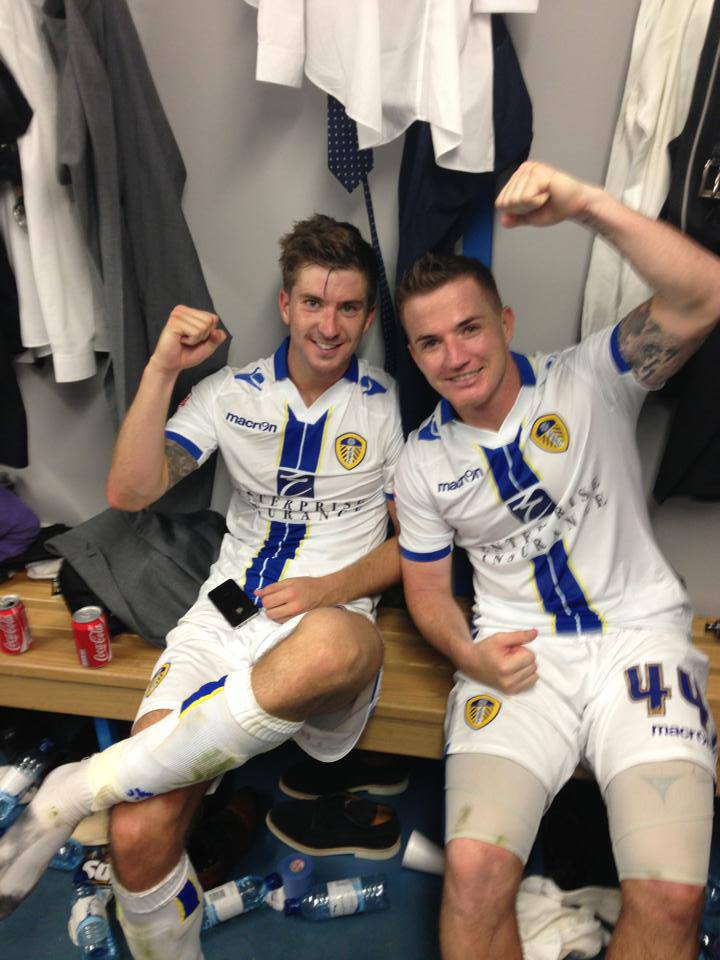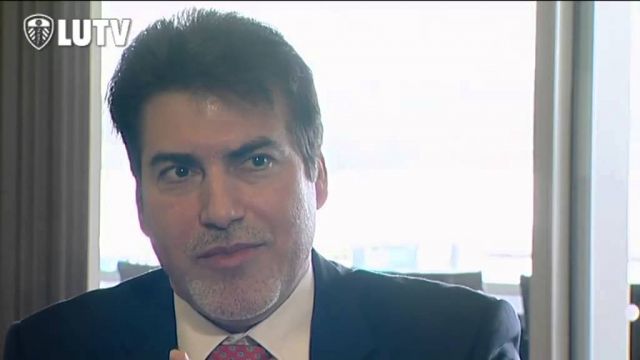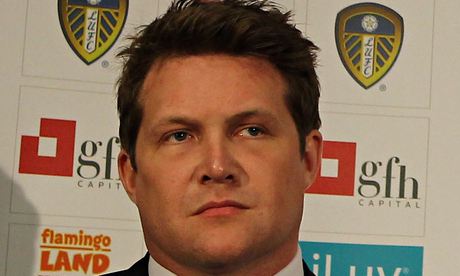 Part
2 Life During Wartime - Part 3 Manager Eater
- Results, table and transfers
Part
2 Life During Wartime - Part 3 Manager Eater
- Results, table and transfers
His opening few months filling supporters with hope, Brian McDermott
approached a summer in the transfer market in bullish mood.
The signing of Oldham striker Matt Smith was announced on 10 June but
18 days later the Yorkshire Evening Post reported that McDermott
would have to start selling players to free up space for newcomers with
GFH having little or no funds available for transfers. El-Hadji Diouf,
David Norris, and Adam Drury were all made available for transfer with
a view to cutting the £15 million wage bill. McDermott confirmed he had
already received enquiries for one or two players.
Steve Morison left on a season-long loan to former club Millwall, allowing
McDermott to secure an old favourite, 30-year-old Reading striker Noel
Hunt, on a free transfer.
Also arriving on a three-year deal was highly rated Crewe midfielder
Luke Murphy, for whom United paid £1 million, making him the club's first
seven-figure transfer since Richard Cresswell joined from Preston in 2005.
United kicked off the season playing hosts to Brighton. The game drew
a crowd of 33,432, the first time the 30,000 mark had been exceeded in
the Championship in almost 17 months and the highest league gate for three
years, a telling increase of around 10,000 on the previous year's opener
against Wolves.
It was the first match since the departure of Bates, something the crowd
celebrated with chants directed against the 'Chelsea bastard'. There was
a 'new dawn' feel to the affair, but the supporters were hushed by an
early goal from Leonard Ulloa. There were sighs of relief when McCormack
equalised within five minutes.
The game was drifting to a draw when Murphy snatched a debut winner with
virtually the last kick of the game in the fourth minute of stoppage time.
Smith knocked down a long ball for Murphy to drive home, the goal standing
despite strong suspicions of handball.
United failed to build on a promising start in the derby against Sheffield
Wednesday on 17 August, requiring an equaliser from McCormack on the hour
to cancel out the Owls' first half goal.
The goal was delicious; receiving the ball 40 yards from goal, the Scot
scuttled forward with the defence stretched. He slipped the ball perfectly
round a defender, left him for dead, and coolly slotted a strike past
the goalkeeper.
The sublime contribution emphasised McCormack's value to a team that
was distinctly average. McDermott was quick to acknowledge the quality
of his star man and the difference he made to the team.
McDermott and McCormack formed a powerful bond in their time together,
each recognising the value of the other and the importance of loyalty.
The manager was consistent in his advice to the board. Middlesbrough launched
a persistent attempt to sign McCormack. Three times in a fortnight the
Teessiders came in with a bid (starting at £1 million, then £1.3 million,
and ultimately £1.5 million) and three times the bid was rejected on McDermott's
say so.
However, the board was adamant that some players must be sold in order
to balance the wage budget. During his celebration of the goal against
Wednesday, it seemed as though McCormack was cupping his ears towards
the East Stand, from where the directors watched the match.
Manchester United centre-back Scott Wootton arrived and debuted in a
Capital One tie at Doncaster; 18-year-old midfielder Alex Mowatt was also
given a first start. It was a memorable night for both men.
Wootton snatched a poacher's goal after 41 minutes. Academy graduate
Mowatt was enjoying a decent debut and provided the searching cross to
the far post which Smith guided into a gaping hole in Doncaster's box.
Arriving with a late run, Wootton nodded home off the underside of the
bar. There was also much to admire in his calm defensive display.
back to top
Former United striker Billy Paynter scored for Doncaster with his first
touch after coming off the bench, but late goals from Smith (his maiden
effort for Leeds) and McCormack secured victory.
There was more good news when McCormack agreed an improved four-year
contract, but August wound down with United's unbeaten start at an end.
QPR defender Clint Hill scored the only goal of the Elland Road clash
with the Championship heavyweights after 75 minutes.
United had matched the Londoners for most of the game and they came close
to snatching a point when Austin's stoppage time strike from 30 yards
rattled the bar.
A Varney goal secured victory against struggling Bolton at the Reebok
on 14 September, edging United into the Play-Off places and McDermott
crowed, 'The mindset of the players has probably changed since I came
to Leeds. There was a little bit of something back then - fear's too strong
a word, but that sort of thing. What we've got now is fearlessness. There's
anticipation about wanting to go out and play and the anxiety's gone.'
United were on the big national stage on 25 September, paired with Premier
League Newcastle United at St James Park in the Capital One Cup.
After the previous season's Cup exploits, there were hopes of more excitement,
but United never got out of the starting blocks, losing 2-0.
They lost by the same score at Millwall on 28 September, a third Championship
setback in a row. McDermott desperately needed the same loyalty from the
board that he had shown when emphatically distancing himself from the
vacant role as manager of the Republic of Ireland. What the manager received
was a tepid show of support from Salah Nooruddin, tweeting that the club
was looking to reinforce, while opining that the squad was good enough to have seen off Millwall.
that the squad was good enough to have seen off Millwall.
McDermott had shown some indecision as the going got tough and struggled
to settle on his best formation and selection. Against Millwall, he deployed
Varney as lone frontman with Mowatt, McCormack, and Tonge supporting from
deep. It made no difference and United were horribly outfought by another
team with the Indian sign over them. It was clear where the problem was,
they had managed a single goal in five games and the failure to find a
proper replacement for the departed Becchio was sorely evident.
United scored late to beat Bournemouth 2-1 but then lost 3-1 at bogey
club Derby County, under new manager Steve McClaren. They recovered to
hammer Birmingham City 4-0 at Elland Road on 20 October with one of their
most comprehensive performances of the season.
McDermott was now operating with three centre-backs (Wootton, Lees, and
Pearce) and deployed Byram and Warnock as wing-backs in a five-man midfield.
It certainly worked for McCormack and Smith, scorers of three of the
goals, and the two were beginning to form a productive partnership.
In the wake of the victory, United recruited Nottingham Forest striker
Dexter Blackstock, the club's 75th loan signing since 2004, and signed
Hearts central defender Marius Žaliukas,
a Lithuanian international, on a short-term contract.
Blackstock came on as a 72nd minute sub in the derby at Huddersfield
on 26 October and scored almost immediately to make it 2-2, but Jon Stead
won the game for the Terriers when he added their third a few minutes
later.
The striker seemed set for a healthy future at the club but managed just
four games before both his loan spell and his season were ended when he
sustained a knee injury in training. He returned to Forest on 10 December.
By November, GFH Capital had sold more than half of its shares. IIB had
bought 10% and Nooruddin possessed at least 10% through his Envest vehicle;
he also owned 5.71% of GFH Capital's share.
Gulf Finance House had already booked a $10.4m profit on the Leeds deal
in its 2012 financial statements but there was speculation that the club
were closing in on a 'multi-million pound investment', with global drinks
giant Red Bull said to be waiting in the wings.
LUST was preparing its own bid and a 'wealthy interested party' had offered
to match pound for pound any monies raised by them. LUST also declared
their support for a bid by TogetherLeeds, a group involving Lucas Radebe,
Adam Pearson, Welcome to Yorkshire chief executive Gary Verity, and ex-Manchester
United employee Mike Farnan, though their £7 million offer for an 80%
stake was rejected out of hand.
Pearson denied involvement, but Radebe confirmed he was part of a consortium
which had submitted a 'preliminary indication of interest', saying, 'Leeds
United has a special place in my heart. Ever since I retired, I have been
considering ways to get involved at the club. Working at board level with
an equity interest would be the pinnacle. It is my dream scenario.'
But the smart money was on David Haigh's Sport Capital company, the vehicle
for a consortium of businessmen, including Enterprise Insurance managing
director Andrew Flowers, a lifelong United fan.
Enterprise, who were in their third season as the club's main sponsor,
extended their sponsorship agreement on 2 September 2013, with the shirts
due to carry the Enterprise brand until June 2017.
Enterprise had advanced working capital, on 22 October 2012 agreeing
a 7% fixed rate secured loan note of £1.5 million, repayable in 2015.
back to top
In November 2013, Haigh confirmed that Sport Capital was providing a
'seven-figure investment' to support McDermott's transfer plans. The accounts
confirmed the  amount
as £1,775,000. At the end of the month, GFH Capital granted a period of
exclusivity to Sport Capital, which had signed a share acquisition agreement
for 75% of the capital, with GFH retaining a significant stake.
amount
as £1,775,000. At the end of the month, GFH Capital granted a period of
exclusivity to Sport Capital, which had signed a share acquisition agreement
for 75% of the capital, with GFH retaining a significant stake.
Sport Capital had been funding the club during the transitional period
and would continue to do so until the takeover was completed, expected
before the end of 2013. The only barrier to progress seemed to be Football
League approval of the offer.
Haigh claimed that they planned to buy back the Elland Road stadium and
were negotiating the return of Max Gradel.
According to Flowers, 'a lifelong Leeds United fan', Sport Capital was
working hard to ensure that due diligence was completed as quickly as
possible and echoed Haigh's promise that funds were in place.
Haigh also announced a partnership with NFL's San Francisco 49ers. A
delegation from the American Football pioneers met senior club officers
to discuss key areas of the business, including sponsorship and commercial
opportunities.
As a result of the news, Gulf Finance House share prices increased almost
15% to a two-year high and confirmed in a statement to the Dubai Financial
Market that it had signed an agreement with a consortium of British investors
for a partial sale of its shares in the club.
But there was a hint of discord when GFH representatives refused to sanction
the proposed transfer of Ashley Barnes from Brighton, a deal that had
been reported to be 'as good as done'. United had the cash in place to
pay an up-front fee of £500,000 and were confident of persuading Barnes
to reject Burnley's offer in favour of signing a contract at Elland Road.
Sport Capital's emergence as owners in waiting suggested that GFH's influence
had waned significantly but the dispute over Barnes raised questions about
worrying divisions at the highest level.
Despite GFH confirming that they would retain a 10% shareholding, the
Sport Capital deal was floundering with the parties at odds over 'unspecified
issues relating to the terms of the sale'.
Neither side would offer any comment since a statement released by Sport
Capital that the buyout had taken 'longer than we anticipated', though
they vowed to work towards a 'successful conclusion sooner rather than
later'.
Part 2 Life During Wartime - Part
3 Manager Eater - Results, table and transfers












 Part
2 Life During Wartime - Part 3 Manager Eater
- Results, table and transfers
Part
2 Life During Wartime - Part 3 Manager Eater
- Results, table and transfers
 that the squad was good enough to have seen off Millwall.
that the squad was good enough to have seen off Millwall. amount
as £1,775,000. At the end of the month, GFH Capital granted a period of
exclusivity to Sport Capital, which had signed a share acquisition agreement
for 75% of the capital, with GFH retaining a significant stake.
amount
as £1,775,000. At the end of the month, GFH Capital granted a period of
exclusivity to Sport Capital, which had signed a share acquisition agreement
for 75% of the capital, with GFH retaining a significant stake.